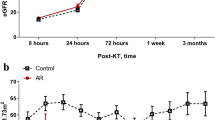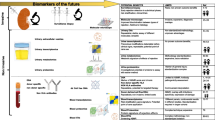Abstract
Research has provided new and potent immunosuppressants which can potentially stop ongoing rejection. Subclinical rejection is a particular problem in the pediatric age group and early identification of children at risk is of the utmost importance. Neopterin has been previously shown to be a non-specific but sensitive marker for immunologic activity. In this study we hypothesized that low serum neopterin in the 1st year after transplantation predicts a low risk of chronic rejection. We retrospectively analyzed serial neopterin data obtained beyond the early postoperative period in 21 children and correlated the peak and average with glomerular filtration rate (GFR) loss during the subsequent years (P=0.63, NS, r=0.10). Our results show that serum neopterin did not differ between the majority of children who developed chronic transplant dysfunction and children with stable transplant function beyond the early post-transplant period. Thus serum neopterin failed to delineate a low-risk population who might be spared more invasive diagnostic procedures such as protocol biopsy.
Similar content being viewed by others
Author information
Authors and Affiliations
Additional information
Received: 22 November 1999 / Revised: 3 August 2000 / Accepted: 11 August 2000
Rights and permissions
About this article
Cite this article
Müller, T., Orgler, A., Bidmon, B. et al. Low serial serum neopterin does not predict low risk for chronic renal graft rejection. Pediatr Nephrol 16, 11–14 (2001). https://doi.org/10.1007/s004670000487
Issue Date:
DOI: https://doi.org/10.1007/s004670000487




